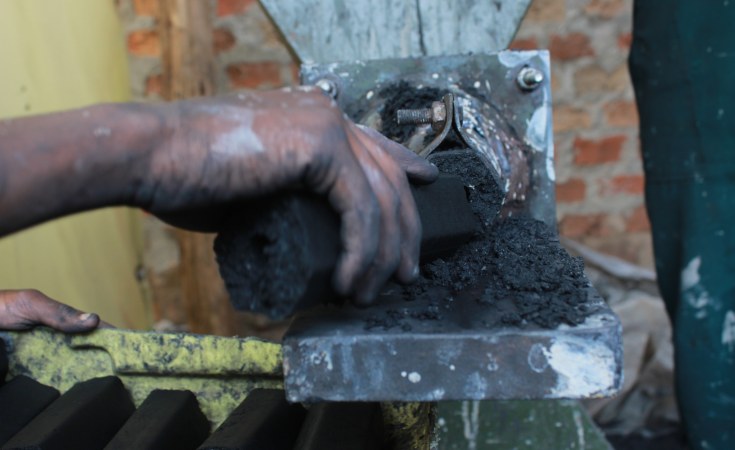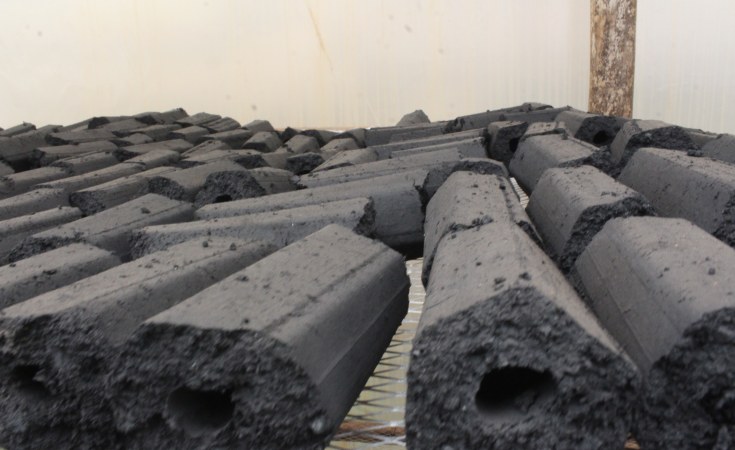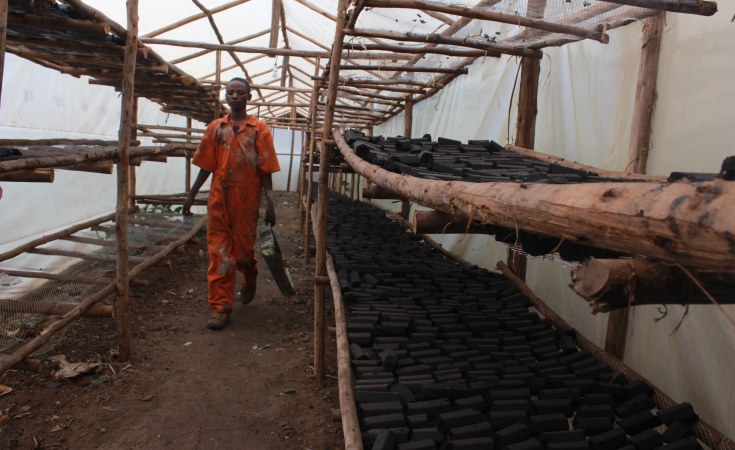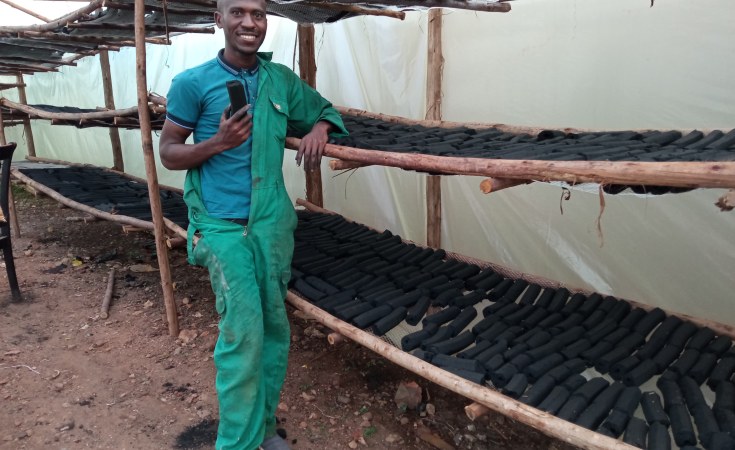Isaac Ndyamuhaki, a young Ugandan entrepreneur with a background in forestry, is passionate about using solutions to help communities become more resilient to shocks like poverty and the global climate crisis. He is the founder and team leader of Asili Kwanza Uganda, a social enterprise that provides safe, affordable, and sustainable energy solutions.
Ndyamuhaki comes from a country where agriculture is highly practiced and large amounts of waste is generated. The majority of the population in Uganda depends on biomass-based fuels, such as charcoal and firewood, which are disastrous for the environment because they require cutting down trees and reducing forest cover. These biomass-based fuels are associated with indoor air pollution due to cooking fires and are responsible for hundreds of deaths.
In response to these problems, Ndyamuhaki founded Asili Kwanza Uganda to convert agricultural waste into briquettes, a smokeless, less expensive, and more sustainable fuel. His social enterprise has served around 400-450 households to date, saving them from indoor pollution and reducing waste dumping in Kampala. Asili Kwanza won the top finalist prize at the Africa Climate Innovation Challenge 2023 for its campaign for safe, affordable, and sustainable cooking solutions.
Ndyamuhaki was motivated to start Asili Kwanza after seeing the negative impacts of agricultural waste disposal in his community. "I looked around and thought, 'Hey, this agricultural waste that is generated is mostly burned or dumped in landfills, which further releases emissions and contributes to the deterioration of the environment. But it could be harnessed into something better," he said.
"Briquettes are easy to make, even with simple locally fabricated machines. The key is to know how to mix the waste materials (raw materials) in the right proportions to ensure a good quality output," Ndyamuhaki said. "Briquettes are a promising alternative to traditional cooking fuels, but their quality and performance can vary depending on the mix of waste materials used."
Reflecting on Asili Kwanza's impact, he said the organisation is proud of its work in the past two and a half years to reduce indoor pollution, save trees, and create jobs in Uganda.
"We're working with informal waste collectors to provide them with jobs," he said. "They're the ones who provide us with the raw materials for our briquettes. We have 12 full-time young employees working in administration, production, and marketing, and another 18 people working indirectly ... such as transporters, commission agents, suppliers of raw materials, and waste pickers. In total, we have around 450 beneficiaries of our work, and we hope to scale that up even more".
We've also recycled 80,000 tons of waste in Kampala, which helps to reduce waste dumping in the city. It may not seem like a lot, but we think it's quite important. And it also means that we're saving trees from being cut down to satisfy the demand for charcoal and firewood, and contributing to overall climate crisis solutions
In addition to discussing Asili Kwanza's impact, Ndyamuhaki also talked about the challenges the organisation faces, such as educating the public about the benefits of briquettes, increasing demand for the product, and securing funding to scale-up operations. He said that Asili Kwanza is still operating on a micro-scale and is unable to address bigger markets due to its limited capacity of three tons per month, but demand is almost triple.
"Another challenge is the changing dynamics of government policies regulating business operations through taxation and other regulations. This makes it difficult for the organisation to operate as efficiently as it could," he said. "Funding is also a major challenge... With additional funding, Asili Kwanza could scale up its production and meet the demand for its briquettes. Another challenge is accessing financing schemes, as financial institutions often have stringent restrictions for startups."
Ndyamuhaki said their company's motto is "conserve and sustain". He also talked about the three flagship products that have helped them to achieve this goal. "We produce more than just briquettes. We also make multi-purpose solar-aided improved stoves with solar panels, fans, and batteries. These stoves burn biomass more efficiently and faster, and can also provide additional energy for lighting and charging phones."
"Only 45% of Uganda has electricity coverage, so many people are left behind. Our solar dryers for post-harvest handling can help. About 99% of Ugandans still dry their crops on the ground, which leads to spoilage and aflatoxin contamination," he said. "In 2021, Kenya refused to import Ugandan maize because of aflatoxin contamination ... a global problem, but it is most prevalent in developing countries where agricultural practices and food storage conditions are less than ideal. Our solar dryers can help farmers produce clean, safe food. We also have solar dryers for other crops, such as cassava and bananas."
Briquettes are a more affordable and sustainable cooking fuel than traditional options
Briquettes are a major advantage for many Ugandans because they are more cost-effective than other cooking fuels and burn cleaner.
"Before I started using briquettes, I used to spend more money on charcoal, and my house would fill with unpleasant fumes while cooking," said Grace Nakatudde, a Ugandan resident. "But after switching to briquettes, I spend less money on cooking and my kitchen no longer fills with fumes. I spend less money on cooking, going from 5,000 Ugandan shillings (about 1.30 USD) to 2,000 Ugandan shillings (about 0.52 USD) per day. Thanks to Asili Kwanza for providing such a great product."

Nakatudde is among hundreds of families in Uganda who use briquettes as a cooking fuel source.
Wood fuels: Necessary, but at what cost?
Wood fuels are the most widely used source of energy for cooking in sub-Saharan Africa, with over 90% of the population relying on firewood or charcoal. Charcoal is mostly used in urban areas, while firewood is the predominant form of wood fuel used in rural areas, according to the Food and Agriculture Organization (FAO). Wood fuels are essential, but their use has significant environmental and health costs.
Clean cooking is a major global challenge, with over 3 billion people relying on polluting fuels and technologies for cooking and heating. This indoor air pollution kills an estimated 4.1 million people each year, including 3.2 million from exposure to soot and smoke from traditional wood-burning cookstoves, according to the World Health Organization (WHO).
Some governments have tried to persuade their citizens to use other fuels, such as liquefied natural gas and electricity because wood burning is seen as outdated and environmentally unfriendly. However, many people cannot afford to use cleaner alternatives and spend long hours each day searching for fuel wood, or resort to collecting and using various forms of biomass, such as grass, shrubs, sawdust, wood chips, trimmings, twigs, animal dung, crop residue, and related plant materials.
The burden of this health crisis falls disproportionately on women and children, as they spend more time in close proximity to the smoke from traditional cooking methods, reports WHO.
Women's role in clean cooking
Women bear the brunt of traditional cooking methods, says clean energy expert Ifeoma Malo. Malo is the Chief Executive at Clean Technology Hub, a pioneering hybrid hub for the research, development, demonstration, and incubation of clean energy ideas, technologies, and resources for clean energy organisations and environment and climate-friendly initiatives across Africa.
Women face grave health risks due to the smoke and residue from their open fire stoves as well as their daily struggles to find enough wood. "While women take up the majority of the burden of cooking activities globally, the heavier risks and costs are largely borne by lower-income countries," she said. "These risks are not just physical and medical (such as the health risks associated with smoke inhalation from cooking with kerosene or firewood); they also bear the risk of traveling far distances to fetch firewood, as well as the risks of sexual harassment."
Malo added that clean cooking access can help mitigate the burden of domestic chores for women and give them more time for other activities. "Thus, if we want to improve clean cooking, women must play a significant role and receive special attention, even as advocates for clean cooking," she said.
"Women are essential to expanding access to clean cooking because they are the primary users and decision-makers, and because clean cooking can improve their health, well-being, and economic opportunities," she said. "Sustainable development and the enhancement of the lives of millions of people worldwide depend on involving and empowering women in clean cooking projects."
Benefits and drawbacks of using briquettes as a clean cooking source
Briquettes are a clean cooking source that offers a number of benefits, said Malo. Briquettes produce fewer emissions and contribute less to indoor air pollution, which can lead to better health outcomes. Briquettes are also more efficient, meaning that they require less fuel and produce more heat for cooking. This can save time and money, and reduce the need for fuel collection, which is often a burden on women and girls. It can help to reduce deforestation by lowering the demand for firewood and charcoal and can be made from agricultural waste and crop byproducts. This can provide an extra source of income for rural communities.
Ndyamuhaki the benefits of clean cooking for women, especially for housewives in Uganda. "Clean cooking solutions protect housewives from the harmful fumes emitted by traditional cooking methods. These fumes can cause respiratory problems, hair loss, and other health problems," he said.
"Women can also save money on cooking fuel. Ugandan housewives typically receive a daily allowance from their husbands, known as Kameeza money, which means 'table money.' This money is usually a subsistence allowance left by husbands in the morning before they go to work. This money is used to cover the cost of basic household expenses. Since housewives do not have a source of income, saving money on cooking fuel is a significant benefit. Asili Kwanza also employs some women as salespeople, providing them with an additional source of income."
Despite the many advantages of briquettes as a clean cooking source, there are also some drawbacks to consider, said Malo. "Briquette production can be labour-intensive and requires specialised tools that may not be easily accessible in some locations. Briquette production requires infrastructure and machinery setup, which can be expensive and burdensome for some people and communities. Depending on the ingredients and manufacturing processes, briquette quality can differ. Lower-grade briquettes may burn inefficiently and emit more smoke. Briquettes are also less available than conventional fuels on the market, and access to them can be restricted in some areas. Briquettes must be carefully transported and stored, just like other types of fuel. In some instances, storage space or shipping expenses may be an obstacle."

"It can be difficult to persuade people to transition from conventional fuels to briquettes. Cooking habits can be strongly influenced by cultural preferences and behaviours," she added. Despite these drawbacks, briquettes remain a promising clean cooking solution with the potential to improve the health, well-being, and economic opportunities of millions of people around the world.
Future of Clean Cooking in the Global South
In order to make rapid progress towards clean cooking, various enabling factors must be addressed, including raising awareness about traditional cooking methods' environmental and health impacts, providing access to clean and affordable cooking technologies, ensuring capacity building and financial support for the development of sustainable fuel supply chains, and providing access to affordable and clean cooking technologies.
Ndyamuhaki envisions a bright future for clean cooking in the global South. He says that "despite the challenges, the future of clean cooking in the global South is bright, thanks to the growing number of initiatives in this space. For example, we are not only looking at improved biomass fuel manufacturing but also at innovative solutions such as solar-aided stoves and affordable low-cost clean cooking technologies. Additionally, there are many other players involved in the clean cooking sector, which validates my statement that the future is bright. Finally, people are increasingly adopting clean cooking technologies because they are tired of traditional cooking methods and the associated health and environmental problems."
Ndyamuhaki believes carbon credits could help with costs for users. It can play a significant role in the future of clean cooking by helping companies to lower the cost of their products for consumers, making them more affordable.
At the Africa Climate Summit, clean cooking was highlighted as a priority climate solution for a sustainable future in Africa
Ndyamuhaki says "I see carbon finance as a very promising avenue for achieving universal access to clean cooking by 2030. It can help business players subsidise clean cooking technologies, making them more affordable for grassroots people. For example, a carbon offset project or agent could give 80% of the cost of an improved stove, leaving the final user to pay just 20%. This would make these solutions much more scalable on the ground. I see carbon finance as a good way to scale up clean cooking and other climate-related solutions for grassroots people, because I've seen it work with others."
The African Carbon Markets Initiative (ACMI) was launched at the United Nations Climate Conference (COP27). It promised to unlock billions in climate finance for Africa, but climate activists warn that it is a dangerous distraction from reducing emissions at the source. A new report, Africa Carbon Markets Initiative: A Wolf in Sheep's Clothing, by climate think tank Power Shift Africa and partners details the dangers of carbon credits and why African leaders must avoid falling into the trap of adopting them. The report shows that the ACMI is riddled with deficiencies and inconsistencies, and will only fling open the floodgates of pollution.
World needs global pledge on renewables, energy efficiency
In Sub-Saharan Africa, over 600 million people lack access to electricity, and almost a billion do not have access to clean cooking fuels and technologies. Africa has the largest gap in clean cooking access, and its clean cooking plans often lack resources. At present, less than a third of these plans are funded, and the COVID-19 pandemic and high fuel prices have led to a reduction in incentives and financial support for households, according to the International Energy Agency (IEA).
However, Africa can overcome its energy challenges and provide reliable, cost-effective energy access to all by 2030 by harnessing its abundant renewable resources, including abundant sunlight and strong winds.
Ndyamuhaki spoke about the partnerships he has established in Africa to expand his clean cooking mission.
"I have established several partnerships in Uganda, given the scale at which I am currently operating. My partners are mainly business development partners, such as Challenges Uganda, an arm of Challenges Worldwide. They are supporting me with business strategising. I also have a partnership with Masrcorp company, which manufactures improved stoves specifically designed for briquettes. We have a business-to-business collaboration where they sell my products to their clients.
"I have also established a partnership with Green Africa Youth Organisation (GAYO), which is supporting me with linkages to potential funders and investing in business modeling and strategising on how to tackle the problem of waste. GAYO has established a zero-waste project in Kampala .. and have waste pickers who are related to my business for taking of the waste recycling."
"The uptake of clean technology will transform the energy landscape by reducing reliance on fossil fuels, mitigating climate change, and promoting sustainable development," said energy expert Malo. "Clean technologies adoption can lead to a more environmentally friendly energy system with significant benefits, including reducing greenhouse gas emissions, accelerating the transition to renewable energy, improving air quality, enhancing energy independence, and creating job opportunities. It also drives technological advancements, promotes energy efficiency, increases resilience to climate change, and stimulates economic growth," she added. "However, these benefits require addressing infrastructure, regulatory, and financial challenges through collaborative efforts from governments, businesses, and communities."

Africa's green future - Jobs, sustainability, and transition
"Young people can position themselves for green jobs by training and retooling themselves in relevant skills. This could include learning how to recycle, make improved stoves, or other green technologies. The green economy is a broad field, so young people should be flexible and open to new opportunities," Ndyamuhaki said.
"The potential for green jobs is significant, as more and more companies are adopting sustainability practices and incorporating green manufacturing into their operations. If everyone continues to adopt sustainability principles, the potential for green jobs is vast. African governments need to establish solid structures and working policies to achieve a green economy. If you look at different countries in Africa at the moment, there are many examples of where these structures and policies are lacking".
For example, in Uganda, there is a problem with people encroaching on natural resources, even though there are laws in place prohibiting this. This is because the government is unable to enforce these laws. This is a problem because the problems we have in Africa stem from structures and policies that do not work."
"Without working structures and policies, it will be difficult to regenerate industries, encourage cooperation on green economy initiatives, and invest in the technology needed to usher in a green economy," said Ndyamuhaki. "This includes investing in technology, such as digital payments, to reduce the use of paper and other resources."
He urged African governments to invest in transitions to clean energy and sustainable manufacturing. This would help to create jobs and boost economic growth, while also protecting the environment. "The most effective way to use green energy is to be sustainable at your own level," added Ndyamuhaki. "This means using energy wisely and efficiently, regardless of the source. We also need to incorporate green energy into manufacturing to reduce the amount of energy needed to produce goods."
Make-or-Break Issues at COP28
As the 28th United Nations Framework Convention on Climate Change (COP28) climate summit approaches, African countries are hoping to advance their climate agendas and advocate for more global action.
The upcoming summit is generating excitement for a groundbreaking event: the first Global Stocktake, a critical component of the Paris Agreement. The Global Stocktake is a two-year process that happens every five years and assesses the global response to the climate crisis. This is an opportunity for countries to agree on concrete milestones toward achieving their 2030 targets, including climate adaptation, finance, and technology.
For Africa, this process is critical as the continent only contributes about 4% to global greenhouse gas emissions but is disproportionately affected by the climate crisis, with increased droughts, floods, and other weather-related disasters, impacting food security and socio-economic development. The Global Stocktake is an opportunity to ensure that the international community lives up to its commitments and that climate action reflects the deep transformations needed across all sectors to build a resilient future for Africa and the world. At COP28, countries must commit to using the stocktake's findings to keep the 1.5°C goal alive and address the impacts of the climate crisis.
COP27, also known as the "Africa COP," was held in Sharm El-Sheikh, Egypt, and resulted in a significant milestone - the agreement on a loss and damage fund. However, many issues remain unresolved. At COP28, African delegates are expected to focus on loss and damage, climate finance, and energy transitions. They will urge other countries to adopt ambitious greenhouse gas reduction targets, renewable energy, and low-carbon technologies, and cooperate more closely with developing nations by providing financial and technological assistance. Last but not least, they will advocate for climate justice and equity, arguing that developed countries should take the lead in mitigating the climate crisis and supporting vulnerable communities.
As for Ndyamuhaki, he wants to see more investment in climate solutions that reach the people who need them most.
Hopes for the future of climate action in Africa
Ndyamuhaki said that his hope for the future is that young people see themselves as solution providers to the climate crisis. He envisions himself as a leader and a practitioner in providing real solutions and alternatives to help everyone make a small contribution towards solving the climate crisis.
He believes that climate activism is important, but that it is not enough to simply tell people what not to do. We need to offer solutions and alternatives. For example, instead of telling people to stop using plastic bags, we need to provide them with affordable and accessible alternatives.
Ndyamuhaki wants to be the person who says: 'Don't cut down trees. Use briquettes for cooking. Use an improved stove. Use this instead of that, and I have justifiable reasons for what I'm saying.'
"I encourage young people and others to take it upon themselves to be solution creators and value creators. This is what we stand for as young people, and it is what we need to do to rebuild ourselves and the communities we serve. Many portray Africans as poor people, but we need to change the narrative and address that problem. While we are fighting climate change, we can also look at it as a precursor for providing solutions to poverty," he said.


